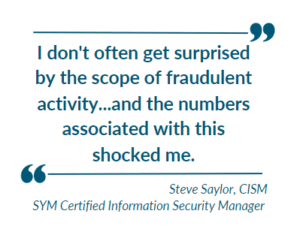What is it? A new cyber scam.
In our last installment, Cyber Security and Your Digital Assets – SYM Financial Advisors –, we outlined how to build an effective cyber security plan. We hope that you are making headway on securing those digital assets. Part of building a strong cyber security plan requires being informed of the ever-evolving criminal scams that attempt to rob you of your hard-earned assets. Personal vigilance is still one of your best defenses. Your most secured assets can still be lost if you are fooled into giving them away to criminals. We want you to know about a particularly egregious swindle called Pig Butchering.
The Indianapolis Field Office of the United States Secret Service recently presented on Cyber Threats and Current Trends at a cybersecurity conference in Fort Wayne. One of the highlights of that presentation was sharing an emerging fraud called “Pig Butchering”. This scam is estimated to become the second largest fraudulent activity, as measured by dollars lost (ransomware is still first by a healthy margin), within the next two years. SYM’s Certified Information Security Manager, Steve Saylor remarks, “I don’t often get surprised by the scope of fraudulent activity … and the numbers associated with this shocked me.”
How does it work?
The scam is termed Pig Butchering because the bad actors fatten up their target before slaughter, so the haul is better.
The hacker typically targets middle aged or older high net worth individuals, often through “random” text messages, social media, and particularly via online dating apps. They find a way to strike up a conversation and eventually drop a hint that they have an inside track on a new cryptocurrency or new equity fund that is paying huge dividends. Now, this part of the scam isn’t really new, that kind of con has been going on in one form or another for thousands of years. However, what had previously been a one-and-done scam has evolved into a much more sophisticated long con.
The scammers will take a relatively modest investment … something like $5,000 and show a ridiculous return in a short time, usually not quite doubling money in 30-90 days. The con continues, with the fake investment offering several rounds of ‘opportunities’ with exceptionally high returns. To build trust and set the hook even deeper, the scammers will even allow the investor/victim to withdraw some or all of their money along the way. The confidence they gain as the fraud develops encourages larger and larger investments. Think of the Madoff con on an individual scale.
You can read the sad details of one man’s tragedy here: How One Man Lost $1 Million To A Crypto ‘Super Scam’ Called Pig Butchering (forbes.com)
You or loved ones can lose hard-earned money.
The Indianapolis Field Agent giving the talk shared that they have worked two cases in the last three months out of the Indy office where the losses were over $800,000 each. People were emptying retirement and investment accounts, and one person even mortgaged their house. They lost everything.
It’s an effective con, because the scammer builds trust over several months with “proven” returns that encourage more and more investment. News about exceptionally high returns related to investments like Bitcoin and Game Stop stock last year provided cover for the notion that the possibility for life changing short term opportunities exists. When you want to believe something and are given a little bit of proof to substantiate it, it’s very easy to be victimized.
What can we do about it?
SYM makes it part of its committed practice to keep an eye out for unusual requests from clients.
SYM invests a great deal of resources to stay educated on the latest scams. Each and every employee is expected to do their part to protect the assets of clients and fight against fraudulent activity. “Often on the front lines of client asset care, we want to be the guardian, the savvy watchdog whenever we can,” remarks SYM Chief Compliance Officer Crystal Creekmore.
Be leery of offers from new “friends.” And please listen for keywords like “high rate of return”, “short term crypto investments” or “new unreleased crypto currency apps”. If you believe you have encountered some sort of online fraud, it’s a good idea to report it to the Internet Crime Complaint Center (IC3) at https://www.ic3.gov.
As a fiduciary working for your best interest, SYM takes cyber security seriously, daily testing protocols and grading ourselves against simulated attacks. The SYM Financial Advisors Client Information Security Brief provides some details about our program.
If you aren’t confident that your assets are protected similarly outside of SYM, please contact us now.
Disclosure: The opinions expressed herein are those of SYM Financial Corporation (“SYM”) and are subject to change without notice. This material is not financial advice or an offer to sell any product. SYM reserves the right to modify its current investment strategies and techniques based on changing market dynamics or client needs. This blog is for informational purposes only and does not constitute investment, legal or tax advice and should not be used as a substitute for the advice of a professional legal or tax advisor. Information was obtained from third party sources which we believe to be reliable but are not guaranteed as to their accuracy or completeness. SYM is an independent investment adviser registered under the Investment Advisers Act of 1940, as amended. Registration does not imply a certain level of skill or training. More information about SYM including our investment strategies, fees, and objectives can be found in our ADV Part 2, which is available upon request.




